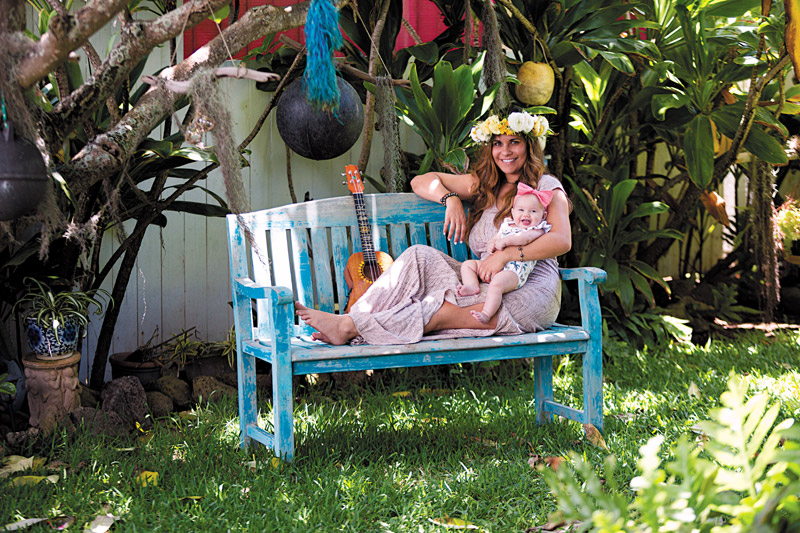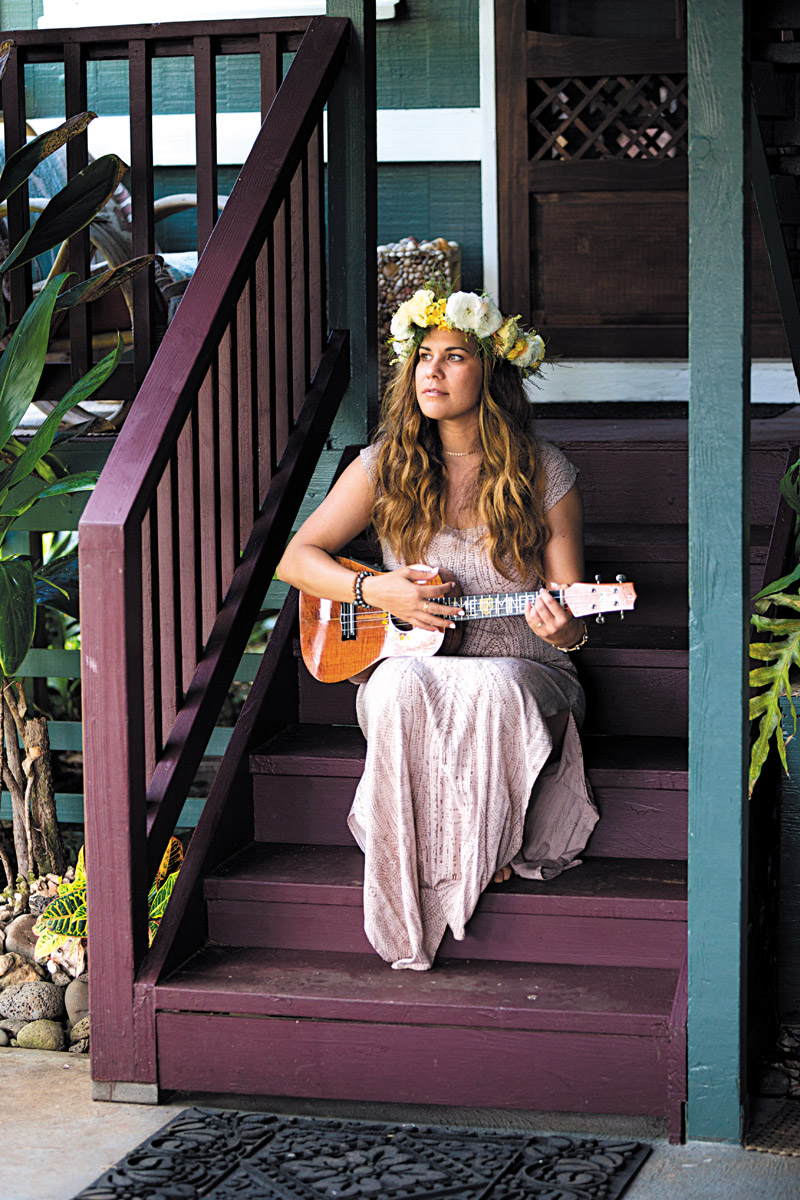A New Day For Kimié

The three-time NÄ HÅkÅ« Hanohano Award winner hangs out in the front yard of her residence with daughter ‘ÅŒmealani.
She writes memorable songs, wins Hōkū awards, mentors fledgling artists and cares for her newborn. It’s all in a day’s work for Kimié Miner.
There’s a glow surrounding songstress Kimié Miner these days that goes beyond her glistening skin. She’s got some extra glimmer in her eye and warmth in her smile. There’s even a bit of incandescence in her every step, as if she’s walking on sunshine.
But as much as some might believe her proud-as-the-sun aura is due to her sizzling slate of upcoming live performances, or attribute her afterglow to leftover sparkle from the 2018 Nā Hōkū Hanohano Awards show last May, when she took home top honors in the Song of the Year (Bamboo) and Female Vocalist of the Year categories, the simple truth is this: The singer-songwriter is gloriously radiant because she’s a new mama.
Yes, six months after giving birth to her first child, Kimié (pronounced Kimmi-Yay, as this “mama bird” is best known to her myriad of “miner bird” followers) has still got the pregnancy glow to show. And that glimmer extends to her sweetest composition yet, an adorable bundle of luminosity named ‘Ōmealani. Fittingly, the infant girl’s name means “the beloved who shines with divine light.”
To have the musician explain her pregnancy: “It was all about a light that I felt through me from her.” This revelatory brightness appears to have illuminated Kimié’s mind as far back as the summer of 2015, when she experienced a vivid dream that foretold her future as a mother.

“It happened exactly two years to the day before I found out I was pregnant,” she explains. “In my dream, I was in the ocean and I was giving birth to a baby. I swam to the shore, where my family was, and as I came out of the water, I looked at her and kissed her lips.
“Her name was ‘Ōmea and she had red hair.”
Since then, the light of motherhood has forced Kimié to learn the delicate art of balancing diaper changes, nighttime feedings and other child-rearing responsibilities with a still-ascending music career — all at age of 33.
“If I have an early morning TV interview one day, then the next two days I’ll stay home just to make sure she can sleep in. Or, maybe we’ll go to the beach,” explains Kimié, whose home in Hau‘ula, which she shares with the family of her boyfriend, professional surfer Makamae DeSoto, is literally a stone’s throw away from the ocean.
“Other times, we’re out all day. But ‘Ōmea is such a soldier. She handles.”
Still, the challenges as a new mom are real, and being able to honestly communicate both the triumphs and struggles to her online “miner birds” has become an added yet welcomed duty.
“Yes, motherhood is tough, and I would never want for it to appear so easy,” admits Kimié, who’ll often pass her most precious moments at home serenading ‘Ōmea with music, including the time-honored ditty You Are My Sunshine, a personal favorite of hers. “That’s really important to me as a new mom, but also for my fans who are new moms. It’s why I have an online blog and why I try to be as open as possible on social media about my own struggles, and share things like, ‘Hey, we were up again at 4 this morning, guys.'”
Yet despite the ups and downs of parenthood, Kimié has found a way to continue to shine — thanks, in large part, to the glow she receives from others.
“I’ve got great help,” she says. “I certainly couldn’t be doing this without having family to support me.”
As if giving birth to ‘Ōmea wasn’t enough, Kimié has somehow found time in recent months to deliver a talent production company as well. Called the Haku Collective, the business represents the locus of her finest altruistic ideas for O‘ahu musicians.
“These are artists who are a part of the new soundscape of music. I noticed that many were under the radar, and so the company gives them a platform to share their music with the rest of the world,” explains Kimié, who finances the entire project and is often assisted at the collective by other established local acts, namely, Paula Fuga, Anuhea, Imua Garza and The Green.
I was really shy about singing in high school. My music was like a diary … it’s why I didn’t share my voice with others because it was all really personal.
One of the company’s initiatives is a bootcamp called MeleCraft, in which artists ages 13-22 come together and learn — free of charge — how to do co-writes in group settings. For many, the possibilities of making a career out of their passion for music while earning what Kimié calls “a sustainable living” are great.
“You don’t even have to be the singer; you can just write an amazing song, and it could be used as a jingle for a commercial, or it could be on TV or on film,” she notes. “How encouraging is that for young songwriters?”
There have been about 60 participants in the first two bootcamps, but Kimié is expecting more to join as part of her grand vision for the collective. “We’re growing,” she says. “I have a preference in that I want to help kids who don’t have as many opportunities, so I do want to expand the program. I’m confident that we’ll be able to go to the west side and eventually to the outer islands as well.”
The confidence she emits these days stands in stark contrast to the reticence of her formative years. Sure, Kimié realized early on in life that she was pretty adept at putting her earthy, easy-on-the-ear vocals to melodies, but this Hawaiian-Portuguese song-bird was also reluctant to let those notes ring out in public.
“I was really shy about singing in high school,” admits the Kamehameha Schools-Kapālama graduate, who grew up in Waimānalo and later in Kailua-Kona following her parents’ divorce. “My music was like a diary, a way for me to express what I was feeling inside. It was just an outlet for me, and it’s why I didn’t share my voice with others because it was all really personal.”
It wasn’t until she began attending University of San Diego that Kimié started to really open up and sing for others. As she grew more comfortable performing for groups of people, some admirers began to encourage her to turn her talent into a career — a move Kimié had long been considering. And so, less than two years into her undergraduate studies, she made the decision to leave San Diego and head north to the music epicenter of Los Angeles.
“I felt like I needed to go there in order to be successful,” explains the artist with a contemporary pop and reggae bent to her music, and who was raised on the vocal stylings of Mariah Carey, Whitney Houston, Lauryn Hill and Teresa Bright. “Plus, I knew that if I failed, I could always go back to school.”
One of the influential people she met in the City of Angels was reggae and dance hall artist Barrington Levy, who wound up taking her on tour as his opening act. Her first show was staged in front of 8,000 people in San Jose, where Kimié got her first dose of stage fright. “It was just me and my nylon-stringed guitar that didn’t even have a pickup,” she recalls. “I was nervous, but Barrington threw me out there. It was sink or swim.”
Naturally, the woman who grew up with a surfboard in hand and adoring the ocean did swimmingly well.
“I always say that I made it through that experience because my passion (for music) was greater than my fear (of performing live),” she says.
Since that day in San Jose, Kimié has been basking in the light of commercial success. Following her foray into the recording world five years ago with her Kickstarter-funded EP, To The Sea, she released her eponymous full-length album in 2015. That opus garnered rave reviews and led to her first Nā Hōkū award for Contemporary Album of the Year. Then, after being featured on R&B singer-songwriter Brian McKnight’s single Goodbye in 2016, she came back even stronger with 2017’s Proud As The Sun, an album that contains her biggest hit single yet, Bamboo.
With gigs abroad (Las Vegas, Nevada, and Vallejo, California — all this month), the future looks bright for the lyricist who loves capturing life’s simple and complex moments, and committing them to song.
For example, her composition Bottom of a Rainbow recalls her childhood dance with her father at Sandy Beach. Another original, Crazy, written at age 21 and which received more than 1 million plays on MySpace, deals with her then-boyfriend troubles while she was living in Hong Kong. And although inspired and written about a friend’s battle with drug addiction, the track New Day has grown to have even greater meaning for Kimié because of her father’s own chemical dependency issues.
“My dad had been in rehab for 15 years, and I remember being really mad at him because I felt that he wouldn’t change. I’d tell myself that people don’t change, they just stay the same,” she confesses. “But then he did. He was able to start over again.”
The track has turned into an anthem for many, and is the one song she never tires of performing live because of its optimistic, sunny outlook on life.
“We all make mistakes and sometimes we’re not having a good day. But this song just makes me happy because every day is a new day.” She then pauses briefly, as if allowing a ray of sunshine to burst forth from her body before adding, “And isn’t that great? All of us get a new day.”




